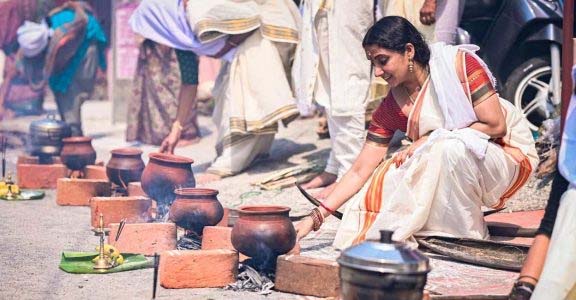In the heart of Thiruvananthapuram, a congregation of numerous female devotees convened to partake in the sacred ceremonial spectacle known as ‘Pongala’ this Sunday. This ritual stands as a monumental testament, ranking among the largest gatherings of women in the global religious milieu.
Throughout this rite, impromptu brick furnaces extended for several kilometers along the city streets, where women meticulously crafted offerings to pay homage to the presiding deity of the renowned Attukal Bhagavathy temple. The commencement of these solemn proceedings unfolded as the chief priest kindled the primary hearth (Pandara Aduppu) in close proximity to the sanctuary, precisely at 10.40 am.
An array of women diligently concocted ‘Pongala,’ a blend of rice, jaggery, and grated coconut, within freshly molded earthen vessels. Positioned on either side of the thoroughfares encircling the shrine, this ritual etched its presence in the annals of the Guinness Book of World Records in 2009, achieving recognition as the most extensive single-day religious assembly of women, boasting a staggering 2.5 million participants.
Since Thursday, women have been streaming into the locale, meticulously selecting optimal locations for erecting their brick hearths in anticipation of the ‘Pongala’ preparation. This ritual serves as the crowning culmination of a 10-day observance at the temple.
The crafting of ‘Pongala’ assumes the form of an auspicious all-female observance, an integral facet of the annual celebration at the Attukal temple, colloquially known as the ‘Women’s Sabarimala.’
In accordance with local folklore, this festival commemorates the benevolence exhibited by women in the vicinity towards Kannagi, the divine embodiment of the protagonist in the Tamil epic ‘Silappadhikaram.’ This gesture unfolded as she embarked on her mission to avenge the injustices suffered by her husband Kovalan, ultimately leading to the destruction of the city of Madurai.
This year’s ‘Pongala’ has garnered attention for a distinctive reason. Churches in the vicinity have adjusted their worship schedules on Sunday to accommodate the anticipated surge of devotees converging to partake in the festivities. Additionally, certain churches are extending the use of their grounds and structures to facilitate the participation of women engaging in the ‘Pongala.’
To ensure the celebration transpires in a hygienic and secure manner, the Kerala government’s Suchitwa Mission has promulgated a set of ecologically conscious protocols.









